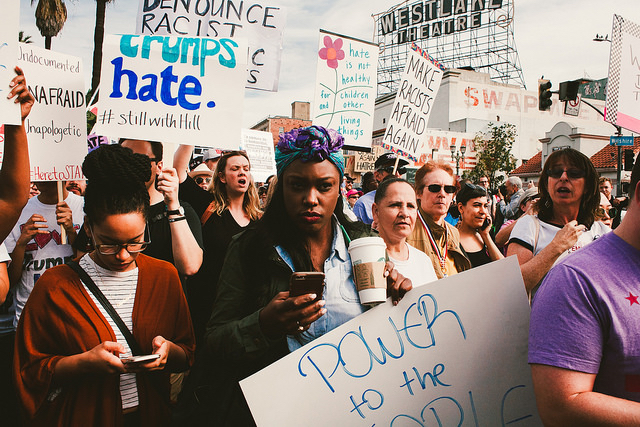Since the election results were announced, Canadians across the country have joined their American neighbours in rallying against U.S. president-elect Donald Trump. There have already been demonstrations against Trump in two major cities in Canada.
“Toronto saw its first major demonstration against Donald Trump’s surprise presidential election win, a rally that saw hundreds blaming his victory on the rise in the U.S. and Canada of racism, sexism, and intolerance toward the LGBTQ community,” the Toronto Star reported.
The first demonstration in Toronto took place on Nov. 13. A similar demonstration also took place in downtown Vancouver on Nov. 10, where hundreds of people took to the streets to protest the election results.
“Dozens of placards bobbed above the crowd with various slogans disparaging president-elect Donald Trump, ranging from ‘Build kindness, not walls’ and ‘Proud supporter of love,’ to ‘Make America safe again,’ and ‘Prejudice kills,'” the Canadian Press reported.
Toronto Star columnist Thomas Walkom wrote that, “An Ipsos poll last week concluded that 70 per cent of Canadians disapproved of Trump’s victory. But the same poll found that 77 per cent of Canadians would consider voting for a candidate who ran on a Trumpian platform of stricter immigration controls, skepticism over free trade and tough-on-crime measures.”
In the early hours of Nov. 9 when the U.S. election results became clear, Conservative leadership candidate Kellie Leitch emailed her supporters with a message of glee.
“Our American cousins threw out the elites and elected Donald Trump as their next president. It’s an exciting message and one that we need delivered in Canada as well. It’s the message I’m bringing with my campaign to be the next Prime Minister of Canada,” she said.
It is possible that Leitch could become the next leader of the Conservative Party when they hold their leadership vote on May 27, 2017.
And while Trump ran as an anti-establishment candidate speaking for those hurt by globalization, a commentary in the Washington Post notes, “An organizational chart of Trump’s transition team shows it to be crawling with corporate lobbyists, representing such clients as Altria, Visa, Coca-Cola, General Electric, Verizon, HSBC, Pfizer, Dow Chemical, and Duke Energy. …Trump’s tax plan would give 47 percent of its benefits to the richest one percent of taxpayers. …There’s a lot that Trump will upend, but if you’re a little guy who thinks Trump was going to upend things on your behalf or in order to serve your interests, guess what: you got suckered.”
Trump will be sworn in as the 45th President of the United States of America on Jan. 20, 2017. Major mobilizations are already being planned in Washington for that day including “Not My President” and “Stand Against Trump, War, Racism and Inequality” protests, as well as a “Women’s March on Washington” the following day.
The Council of Canadians rejects Trump’s stance on NAFTA and the Trans-Pacific Partnership. His rhetoric against those deals does not reflect that the TPP would result in 771,000 jobs lost in all the signatory countries, nor that it would give transnational corporations more power to sue government over public interest legislation, nor that it would give pharmaceutical corporations — like those in his transition team — extended patent provisions and even greater profits.
We remain a committed member of the global trade justice movement that envisions inclusive, environmentally sustainable, non-colonial and democratic economies and trading relationships.
We have also highlighted that climate justice requires trade justice and especially a rejection of the “investment protection” provisions in NAFTA and the TPP that allow transnational corporations like TransCanada to sue the U.S. government for $15 billion over its refusal of the Keystone XL pipeline.
Meanwhile, Trump has said that he supports this 830,000-barrel-per-day tar sands pipeline and has promised to streamline the approval process for pipelines.
We also reject the “free trade vs. isolationism” framing that supporters of NAFTA and the TPP — including Prime Minister Justin Trudeau and President Barack Obama — have used.
This simplistic and misleading construct leaves little room for a third choice: the progressive concept of “fair trade” and the aspiration to build economies and trading relationships that are based on social and ecological justice, on the primacy of democratic rights over the profits of transnational corporations, and on the free movement of people rather than capital.
The Council of Canadians is committed to working with our American friends and allies (and all peoples around the world impacted by neo-liberalism, nationalism, racism and sexism) to build the better, just and inclusive world we all know is possible.
Like this article? Please chip in to keep stories like these coming.



